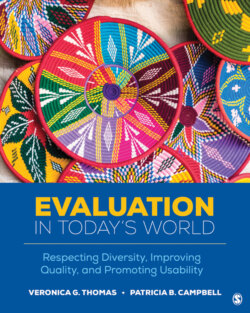Читать книгу Evaluation in Today’s World - Veronica G. Thomas - Страница 12
На сайте Литреса книга снята с продажи.
Introduction
ОглавлениеThis chapter provides an overview of the book, its goals, and its underlying philosophy. It includes an introduction to the content, the major cross-chapter themes, and the framework of the book. In addition, it introduces the concept of cultural competence, which is the ability to understand, communicate with, and effectively interact with people across cultures (Make It Our Business, 2017), and cultural responsiveness, which is the application of the abilities described in the definition of cultural competence. Along with covering issues of objectivity and bias, the chapter discusses the declining trust in science and data, the rise of fake news and alternative facts, and how this can impact evaluators and evaluation. Fake news has been defined as “false new[s] stories, often spread as propaganda on social media. It can also characterize any information that one finds critical about [oneself]” (Dicitionary.com, 2020b, para. 1) while alternative facts are the “opposite of reality (which is delusion), or the opposite of truth (which is untruth)” (Dicitionary.com, 2020a, para. 1).
It is expected that after completing this chapter and the activities, the reader will have an overview of the content covered in the book and know its goals and the general themes that cut across chapters, including the influence of a racialized and social justice perspective on the book. Having a racialized perspective “means paying attention, even when uncomfortable, to the ways in which race shapes problem definition and solution as well as particular group’s access to opportunity” (Thomas, Madison, Rockcliffe, DeLaine, & Lowe, 2018, p. 521).
